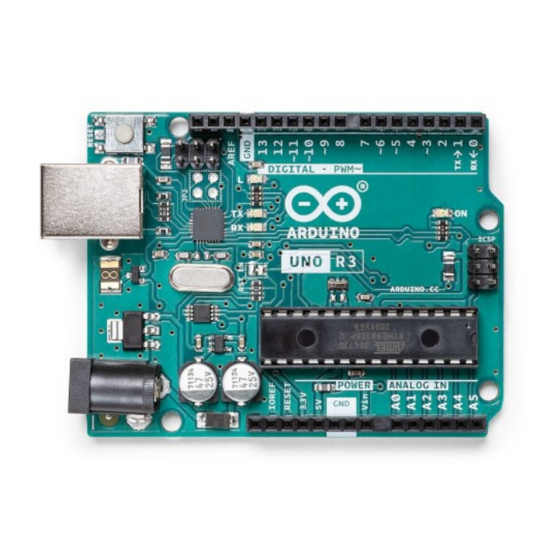
Table of Contents
Advertisement
Arduino® UNO R3
Product Reference Manual
SKU: A000066
Description
The Arduino UNO R3 is the perfect board to get familiar with electronics and coding. This versatile microcontroller
is equipped with the well-known ATmega328P and the ATMega 16U2 Processor.
This board will give you a great first experience within the world of Arduino.
Target areas:
Maker, introduction, industries
1 / 13
Arduino® UNO R3 / Rev. 01 - 25/11/2021
Advertisement
Table of Contents

Summary of Contents for Arduino UNO R3
- Page 1 SKU: A000066 Description The Arduino UNO R3 is the perfect board to get familiar with electronics and coding. This versatile microcontroller is equipped with the well-known ATmega328P and the ATMega 16U2 Processor. This board will give you a great first experience within the world of Arduino.
- Page 2 Interrupt and wake-up on pin change ATMega16U2 Processor 8-bit AVR® RISC-based microcontroller Memory 16 KB ISP Flash 512B EEPROM 512B SRAM debugWIRE interface for on-chip debugging and programming Power 2.7-5.5 volts 2 / 13 Arduino® UNO R3 / Rev. 01 - 25/11/2021...
-
Page 3: Table Of Contents
6.1 Declaration of Conformity CE DoC (EU) 6.2 Declaration of Conformity to EU RoHS & REACH 211 01/19/2021 6.3 Conflict Minerals Declaration 7 FCC Caution 8 Company Information 9 Reference Documentation 10 Revision History 3 / 13 Arduino® UNO R3 / Rev. 01 - 25/11/2021... -
Page 4: The Board
1 The Board 1.1 Application Examples The UNO board is the flagship product of Arduino. Regardless if you are new to the world of electronics or will use the UNO as a tool for education purposes or industry-related tasks. First entry to electronics: If this is your first project within coding and electronics, get started with our most used and documented board;... -
Page 5: Power Consumption
EEE-1EA470WP 25V SMD Capacitor Chip Capacitor, High Density CGRA4007-G Rectifier ICSP Pin header connector (through hole 6) J-ZU4 ATMEGA328P Module ICSP1 Pin header connector (through hole 6) ECS-160-20-4X-DU Oscillator 5 / 13 Arduino® UNO R3 / Rev. 01 - 25/11/2021... -
Page 6: Processor
The Main Processor is a ATmega328P running at up tp 20 MHz. Most of its pins are connected to the external headers, however some are reserved for internal communication with the USB Bridge coprocessor. 3.3 Power Tree Power tree 6 / 13 Arduino® UNO R3 / Rev. 01 - 25/11/2021... -
Page 7: Board Operation
4.1 Getting started - IDE If you want to program your Arduino UNO while offline you need to install the Arduino Desktop IDE [1] To connect the Arduino UNO to your computer, you’ll need a Micro-B USB cable. This also provides power to the board, as indicated by the LED. -
Page 8: Board Recovery
4.6 Board Recovery All Arduino boards have a built-in bootloader which allows flashing the board via USB. In case a sketch locks up the processor and the board is not reachable anymore via USB it is possible to enter bootloader mode by double- tapping the reset button right after power up. -
Page 9: Janalog
SPI Main In Secondary Out Digital SPI serial clock output Power Ground AREF Digital Analog reference voltage A4/SD4 Digital Analog input 4/I2C Data line (duplicated) A5/SD5 Digital Analog input 5/I2C Clock line (duplicated) 9 / 13 Arduino® UNO R3 / Rev. 01 - 25/11/2021... -
Page 10: Mechanical Information
Arduino® UNO R3 5.3 Mechanical Information 5.4 Board Outline & Mounting Holes Board outline 10 / 13 Arduino® UNO R3 / Rev. 01 - 25/11/2021... -
Page 11: Certifications
6.2 Declaration of Conformity to EU RoHS & REACH 211 01/19/2021 Arduino boards are in compliance with RoHS 2 Directive 2011/65/EU of the European Parliament and RoHS 3 Directive 2015/863/EU of the Council of 4 June 2015 on the restriction of the use of certain hazardous substances in electrical and electronic equipment. -
Page 12: Conflict Minerals Declaration
Arduino® UNO R3 6.3 Conflict Minerals Declaration As a global supplier of electronic and electrical components, Arduino is aware of our obligations with regards to laws and regulations regarding Conflict Minerals, specifically the Dodd-Frank Wall Street Reform and Consumer Protection Act, Section 1502. Arduino does not directly source or process conflict minerals such as Tin, Tantalum, Tungsten, or Gold. -
Page 13: Company Information
Important: The operating temperature of the EUT can’t exceed 85℃ and shouldn’t be lower than -40℃. Hereby, Arduino S.r.l. declares that this product is in compliance with essential requirements and other relevant provisions of Directive 2014/53/EU. This product is allowed to be used in all EU member states.












Need help?
Do you have a question about the UNO R3 and is the answer not in the manual?
Questions and answers